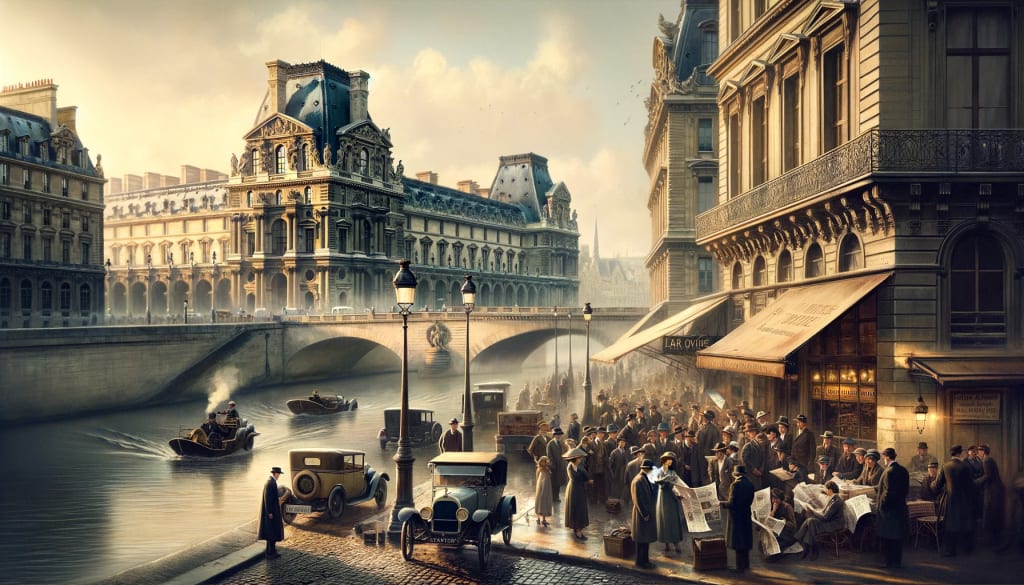
Paris, 1911.
The first strands of the early morning sun filtered over the Seine, creating an ephemeral glow that seemed to emanate from the river rather than the sky. Languidly, the streets began to awaken; cars slunk into the roads, their wheels turning in time with the steady hum of the city. People slowly culminated in coffee shops; sitting nonchalantly on the streets outside - sipping coffee and smoking their breakfast in hoops into the air. Many were reading the extra edition of, ‘Le Temps’; an unprecedented occurrence for the print industry at the time. But not as unprecedented as the headline it presented, ‘La Joconde! Volée!’
The chatter became more animated as the news travelled from the platforms of the, ‘Gare du Nord’, along the railway lines and into the alleys and veins of the waking boulevards.
The Mona Lisa, Leonardo da Vinci's masterpiece, had vanished from the Louvre.
As gossip and hearsay began its steady journey through the city and further into the towns and villages of France, Alphonse Bertillon, the renowned criminologist, was ensconced in the enclaves of the revered gallery. With a keen eye for art and an equally keen disdain for the foibles of the rich and powerful, he was deemed the perfect choice to lead the investigation into the seemingly impossible vanishing act of the lady with the smile.
Bertillon twisted his moustache between his worn fingers; staring at the outline of empty space - as if hoping for a clue to jump from the confines of the wall and present itself to him with a courtesy. His men scoured the grounds of the Salon Carré, they found the frame and glass in the well of the small staircase leading to the Visconti courtyard with relative ease. But nothing more. There were no signs of a forced entry. No broken windows. Very little to go on. Except of course the only logical, rather banal conclusion. It must have been someone on the inside. Someone with easy access. Yet, the fingerprints taken from the 257 employees revealed nothing. It was a conundrum.
Outside, the once docile city had become fevered and hectic as the Parisian police descended like pigeons, pecking and probing unfortunate passers-by. At Bertillon’s immediate order, in the courtyard, they cordoned off an area specifically for museum staff. There they would be interrogated until on the brink of an untrue confession.
The whispers on the streets were heightening but it was in the darkened corners of the art world where they pitched into a siren. Thefts of this magnitude were not crimes as such, they were statements. And Bertillon knew it. He was either dealing with another artist –sickeningly obsessive and jealous of the success of the painting perhaps or a master thief wanting to showcase his skill. Or political maybe? With a distinct lack of clues or evidence, Bertillon decided to trust his intuition, he would proceed with the former.
In the 18th arrondissement at Montmartre where artists and the antichrist were largely one and the same - suspicions had begun to stir. Picasso was acting strangely. He had retreated. The usual flamboyance of the oil painter who conversed in heavy, unapologetic strokes and assured abstract tones had dissipated. He had all but vanished from the bohemian scene and had withdrawn silently to his ramshackle studio.
Bertillon had a lead.
Picasso was gracious enough when he opened the door to a uniformed police officer, ushering Bertillon in politely, he gathered up paints and brushes from a singular stool.
He sat on the floor in front of it. Seeing the inspector’s eyes lean in toward the painting half-finished on the easel, he explained anxiously, ‘L'Accordéoniste’ or at least it will be if I ever complete it.
“It is already quite beautiful”
"Good artists copy, great artists steal." He shrugged,
“Excuse me?”
“What I mean to say is, if you don’t mind me saying so is, well I suppose what I mean to say is that, in order to create art you have to steal from the minds of men. Believe them. Not merely copy them. They have to become yours. Even though it wasn't in the first place, Nothing ever is.”
“Profound” The inspector nodded half in agreement. He cleared his throat as he began his interrogation. The encounter was tense but Picasso held his own, answering with an uncharacteristic clarity and precision. However, he could not help but acknowledge his admiration for the audacity of such a theft. Who would have such spirit? The thief was, in his mind, rather ingenious.
Bertillon left, not entirely convinced of Picasso’s involvement but not ruling him out either. He was for now the main suspect. So, the inspector took his time to integrate himself into the Montmartre community, stopping to talk with the various bohemian artists offering caricatures or made to go landscapes to zealous tourists. He learned more of Picasso’s eccentricity and sporadic behaviour, cementing the doubt that his first lead was indeed acting strangely. But that was his modus operandi. He was a character who was either all in or all out. And stealing paintings didn’t match the profile he was building. He also learned of the deeply rooted emotions of the creative; something he had never had to confront. He was steadfast and not easily prone to feelings of any kind. Logic and fact had always ruled his every decision. There was little room for feeling. But, the hill was thriving with emotion; imbued with jealousy and an artistic covetousness he had not expected. He began to realise that such a theft was not one motivated by money or attention but something far more intangible and deep-rooted. The painting was worthless to a private collector. No, he had concluded, this was a challenge to the world of art. An act of defiance and dissidence.
In the outskirts of the city, the real thief followed the news with glee; clipping newspaper stories as trophies, testaments to his own prowess. The investigation was floundering and he had escaped unscathed. And his motive, none of what Bertillon had concluded. He was by his own admission, quite brilliant. Sneaking in like that. Staying the night like it was a B & B. Genius!
That smile, Bertillon thought as he switched off his bedside lamp, that damn smile.
As the summer rolled into the falling leaves of autumn, Bertillon’s thoughts often returned to the enigmatic smile of the Mona Lisa. It had taken on a new depth of meaning since its disappearance. The public had embraced it as a national treasure. A representation of their own identity. It had become a symbol of the unattainable. The subconscious of a nation and the mysteries it held. And his ego was determined to keep his reputation intact He would find her..
There were rumours, of course, and Bertillon followed them like a greyhound chasing after a rabbit. Following leads that led down warrens and tunnelled into tunnels and back again. Rich private collectors, smugglers, he had tracked them all. But still, his intuition niggled, biting at his dreams, the answer was far closer to home than the gossips would have him believe. He was sure.
Almost a year after the theft, the infamous space in the gallery was filled by Raphael. Bertillon was almost inconsolable; his sleep infiltrated by thoughts of his own failure. And as his self-doubt grew, so too did his determination to recover the smile.
The leaves shrivelled into winter. But for the inspector, hope would come in an unexpected form. An epistle, originating in Florence. Buoyed like a leaf in the wind but sunken by rainfall, Bertillon accepted the invitation for a secret rendezvous. How could he not?
Pont Neuf, Midnight.
Though the lights of the city made it seem more tactile, the river was calm that night. Bertillon waited, soothed by the stillness of the city he loved. Seemingly out of the stone wall of the bridge, a man stepped forward, his voice heavily accented began to reveal his tale. He knew where the painting was. It had been authenticated and in three days, it would be the property of his small gallery in Florence.
Bertillon, not sure whether to embrace the man or punch him in the face for lying, stood agape, “But why…why tell me? It’s worth a fortune…That painting”
“It iz worthyless to me. Uh watawoodeye douh wif it-uh? She iz zuh Gioconda for the worlda, no uh meya“
Three days later,
Bertillon joined the Italian police at the exchange point on the Ponte Vecchio. Vincenzo Peruggia, 32, was arrested with the painting tucked into his white smock.
The trial was brief. His motives were neither money nor fame. But a misguided and not entirely unfathomable desire to return the smile to its origins. He had fallen in love with her he said. And those were the only words he spoke during his trial. He was silent as he was led down the stairs from the dock and ushered into a car to the psychiatric facility, where he would be taken care of until his death.
Bertillon was a hero once again. ‘La Joconde’ was returned to France along with his reputation.
And, 'The Mona Lisa' had been returned to the world. A gift.
Not long after, in the Tuscan hills, the certifying psychiatrist retired to his palazzo. His art collection had reached its zenith. There was nothing more to achieve. La Gioconda was home. He could stare into that smile for the rest of his days. It wasn’t worthless to him.
About the Creator
Enjoyed the story? Support the Creator.
Subscribe for free to receive all their stories in your feed. You could also pledge your support or give them a one-off tip, letting them know you appreciate their work.





Comments (12)
Test is not accepting comments at the moment
Want to show your support? Send them a one-off tip.